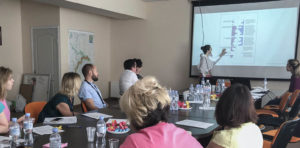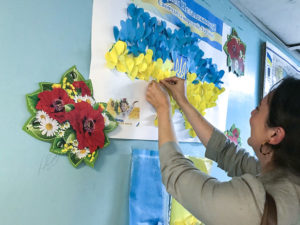After an initial scoping mission in November 2018, we returned to Ukraine for a second time in early June. JIPS’ Head of Information Management and Innovation Wilhelmina Welsch and Information Management Officer Melissa Weihmayer met partners in Severodonetsk, in the Luhansk Oblast, located in eastern Ukraine, as well as in Kyiv, the Ukrainian capital, with the aim of jointly developing a methodology for a profiling to inform a durable solutions analysis.

Wilhelmina Welsch arriving at the train station in Sloviansk, Ukraine to start the mission. This is the nearest train station to Severodonetsk, since the conflict interrupted access to the closer Luhansk City in 2014.
The Ukrainian context made us realise yet again just how different each displacement context is. In fact, most of the partners JIPS met in the Luhansk Oblast were IDPs themselves: people who had been forced out of their homes and lived in displacement ever since. The local administration and its employees moved from the oblast’s administrative capital Luhansk to the city of Severodonetsk as a result of the conflict. Often, displaced people even remain within the same oblast (province) where they used to live, but on the other side of the “contact line”, the line that separates the areas still under the control of the Ukrainian government and the “Non-Government Controlled Areas” beyond. Interestingly, this made it somewhat more commonplace to talk about internal displacement and its impact, compared to the sensitivities that this topic presents in other contexts.
In addition, contrary to many other situations of internal displacement, in Ukraine there is an abundance of data on IDPs and their situation. However, this information is largely held at the national level and insufficient or inadequate to help local authorities prioritise and allocate resources to address internal displacement. Local authorities, by contrast, manage extensive administrative lists that they use for the specific services they provide, but these sit in separate databases and cannot be easily brought together for a more strategic overview of the situation across departments and actors.
This is where the profiling exercise is intended to come in: it could help fill critical data gaps at the Luhansk Oblast level while also strengthening the links between the local and the national level information systems, contributing to efforts towards the implementation of the national “Strategy of Integration of Internally Displaced Persons and of Implementation of Durable Solutions on the Internal Displacement for the period up to 2020” (also available in English), adopted in November 2017.
Starting out our mission with a two-day workshop on how to analyse durable solutions proved particularly useful, not only to update the exercise’s overall objectives and initiate work on the profiling methodology, but also to contextualise the exercise to the specific displacement context in the Luhansk Oblast. It gathered representatives from various departments of the local authorities and the local statistics office, as well as NRC, UNHCR, the Global Centre for the Responsibility to Protect (R2P), and the locally based NGOs Caritas Ukraine and Ukrainian Red Cross.
The rich discussions also brought our attention to some of the key technical issues that may impact the exercise according to our partners’ experiences. Besides low response rates to household surveys and the lack of up-to-date census information, this revealed one particular challenge related to obtaining an adequate sample of the IDP population that could fit the purpose of analysing durable solutions in this context.
In order to do so, a representative sample of both the IDP population and the non-displaced would need to be selected to enable a comparison of their situation along key criteria such as access to livelihoods, housing, and documentation. Due to advanced data protection legislation in this context, however, the profiling partners would have limited access to the national government’s IDP registry that could help in drawing a sample. This issue is not uncommon in IDP contexts but does require a shift in thinking about how to approach the sample-based household survey for this exercise.

Wilhelmina Welsch is explaining the types of results that profiling partners can get from an analysis of IDPs’ progress towards durable solutions during a 2-day methodology workshop.
In the week following these encounters, we went to Kyiv in order to strengthen linkages between the oblast and the national level. In fact, the technical assessment expertise is mostly concentrated in the country’s capital and shared through e.g. the Information Management Working Group as well as individual actors leading major national-level data collection initiatives. Bridging these levels, we believe, will help ensure that the profiling exercise covers relevant information gaps and adequately aligns with ongoing assessment activities, focusing on the interoperability of analysis across a set of core indicators.
We thus held a series of meetings with high-level government partners, including representatives of the Ministry of Social Policy (managing the IDP registry for the disbursement of social services) and of the Ministry for Temporarily Occupied Territories (focusing on policies to contribute to long-term integration of IDPs and among the driving forces behind Ukraine’s national strategy for responses to internal displacement), the National Statistics Office (whom we also work with in the IDP subgroup of the Expert Group on Refugee and IDP Statistics, EGRIS) as well as technical counterparts from international organisations and the UN.
At JIPS we have a role to play in facilitating information exchanges and even encouraging the creation of new workflows, such as interactions between partners at the central, local and regional levels, or between institutions within the oblasts that might not have had the opportunity of working together before. We witnessed one such moment in Severodonetsk, where the representatives of the local statistics bureau and members of the oblast administration took the time to discuss how to reinforce their working relationship.

JIPS’ Wilhelmina Welsch adds a heart-shaped sticky note to a map of Ukraine during our team’s visit to the local statistics office in Sievierodonetsk.
This recent mission to Ukraine also reminded us of the importance of tailoring our approach to fit the diverse partnerships we are engaged in, both at the regional and national levels. Key is to ensure that the expertise that local authority partners bring to the table can be incorporated into the methodology and analysis process. We set the stage for this during the workshop in Luhansk, but recognised early on that we engaged in too granular a discussion on methodologies before mapping out the wealth of information they already had available and were keen to contribute to the process.
We look forward to building off of their experiences and also to engaging with technical experts in Kiev to move the methodology forward in our next technical mission planned for late July 2019.
—
Want to learn more about devising solutions strategies and choosing indicators for a durable solutions analysis? Visit the Durable Solutions Indicator Library and the JIPS Essential Toolkit (JET), or reach out to us at info@jips.org or on Facebook, LinkedIn and Twitter.